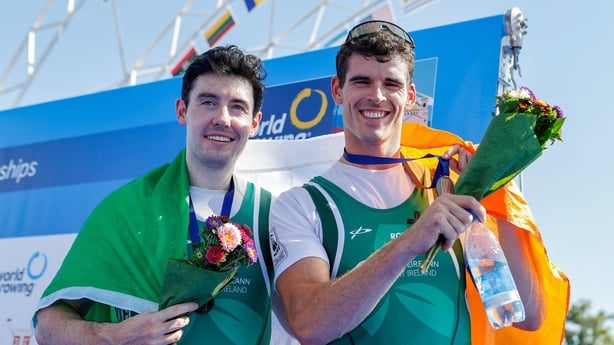The temperature was heading to 34 degrees at the Vaires-sur-Marne Nautical Stadium, the venue for the rowing at Paris 2024.
After a while being seated in the same spot for more than a few minutes was no longer an option. One of the volunteers offered me an umbrella, but I needed one in a fixed position and the practicalities did not allow. It was time to go indoors, where the queue for the water dispenser was lengthening.
Earlier, on the walk to the venue, which took about 25 minutes after the shuttle bus dropped us off, the burning sensation was there if you stood too long, particularly for the fair-skinned type.
All this heat, we're told, is going to spark off thunderstorms later.
On the water itself, Philip Doyle and Daire Lynch looked a cut above the rest as they advanced to a double sculls final. There was disappointment, however, for Zoe Hyde and Alison Bergin in the women's equivalent, while the women's four of Emily Hegarty, Natalie Long, Eimear Lambe and Imogen Magner also failed to make it from their repechage into the semis.
But for Doyle and Lynch, their time of 6:13.14 was the quickest of all the qualifiers. Favourites for the gold then? Well, maybe that's too easy to say.
In rowing, one of the metrics that is key is the stroke-rate.
In doing some research on this, it would seem that across all the boats used in Olympic competition up to last year's World Championships, the average stroke-rate is 38.9 strokes per minute. Back in 2017, it was 36-37spm. In all men's sculling events, the stroke-rate has seen continuous growth since 2021
So what do our two Olympic finalists have to say about their SPM?
After securing their place in Thursday's medal race, Daire Lynch told a few sweaty reporters: "We would be aiming for in or around 38, 39. Everyone is 38, 39."
Right on the mark where one wants to be.
With Thursday's final in mind, Lynch added: "The Romanians are over 40, the Dutch are hitting 40. The game has moved on from the 36, 35 era of when I was first coming to competitions in 2018, 2019.
"Robbie Manson (a New Zealand rower) started it in the single in 2018, going down to 37, 38 in the scull, which is mental.
"I think everyone is starting to learn to be more efficient with the stroke-rate and keep the thing spinning, but then the hard part from there is where is the ceiling? It's how high can you actually keep the stroke-rate while keeping the speed."
So the greater the stroke-rate, the faster you go? Well, size matters, too.

Philip Doyle continued the lesson: "It's the same as the cadence on a bicycle. You have to find the right gear to allow you to take a certain number of turns in the stroke within a minute to keep the best speed.
"If you’re a big 7ft 7 lad with 150 kilos you’ll want to take 34 strokes and give her big massive wellies every now and again.
"But as you’ve probably seen we’re not the biggest men around the place; there are big boys walking around here.
"But I think we’re aggressive, we’re strong and we’re confident, and we’ve got the fitness to match it, so definitely a formidable enough duo."
Together, Doyle and Lynch won a bronze at last year's World Championships, in a competition where they did not win a race. In Paris, they've led the boats home in the heat and semi-finals.
For Doyle, after the disappointment of not making a final in Tokyo, he, nevertheless, is confident he and his partner can now deliver at these Games.
"In Tokyo I had notions of silverware and things and it didn't go to plan so you reel back your expectations a little," he said.
"I’ve always been fairly transparent that I want to make it to the medal final. And if we make it to the medal final that I’d have the confidence in us as a boat to perform, whatever our performance is whether it’s sixth or first, it’ll be our best."
Lynch also struck a confident note and a word to say about the Romanian pair.
"We're showing good signs that we’ve timed it fairly well," he said.
"The last block before we came here was probably our best one yet. Hopefully we can bring that into the final.
"I'd be friendly enough with the Romanians but they are getting a bit cheeky these days, so we’re keeping the banter high between us to see where we go."
Listen to the RTÉ Olympics Podcast on the RTÉ Radio Player, Apple Podcasts, Spotify, or wherever you get your podcasts
We need your consent to load this rte-player contentWe use rte-player to manage extra content that can set cookies on your device and collect data about your activity. Please review their details and accept them to load the content.Manage Preferences



